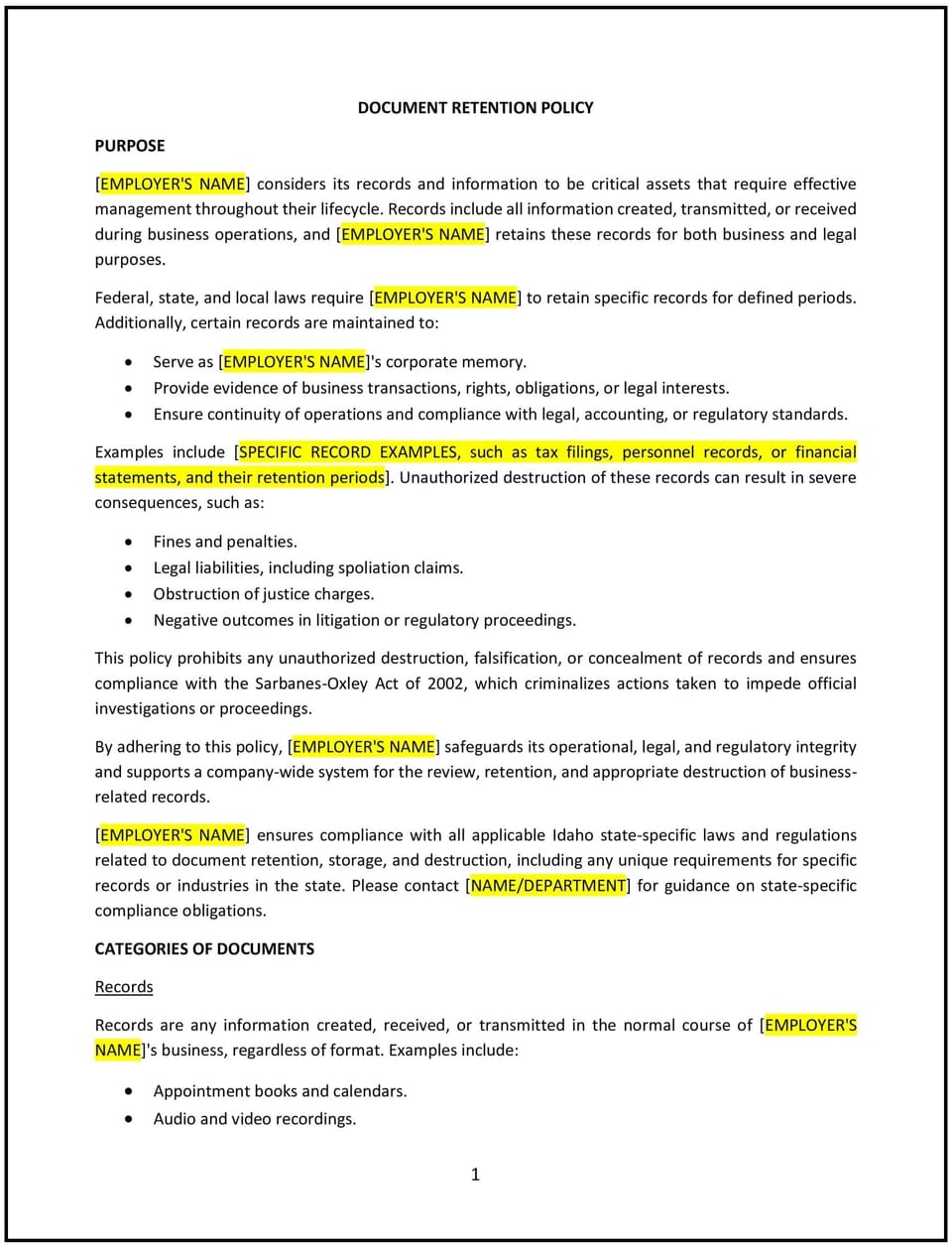Document retention policy (Idaho): Free template

Document retention policy (Idaho)
A document retention policy helps Idaho businesses establish guidelines for managing the storage, retention, and disposal of business records. This policy outlines the types of documents to be retained, the duration of retention, and the procedures for secure disposal. It reflects the business’s commitment to maintaining organized records, protecting sensitive information, and aligning with legal and operational requirements.
By implementing this policy, businesses can improve efficiency, reduce risks, and ensure accountability in record-keeping practices.
How to use this document retention policy (Idaho)
- Define document categories: Specify the types of documents covered by the policy, such as financial records, employee files, contracts, and tax documents.
- Establish retention periods: Provide clear guidelines for how long each category of documents should be retained, based on legal, regulatory, and business needs.
- Outline storage methods: Describe the procedures for storing documents, including physical storage, digital storage, and access controls.
- Address disposal procedures: Provide guidelines for securely disposing of documents that are no longer needed, such as shredding paper records or permanently deleting digital files.
- Assign responsibilities: Designate roles and responsibilities for managing document retention, including who is responsible for maintaining and disposing of records.
- Train employees: Conduct regular training sessions to educate employees on the policy, document handling procedures, and the importance of record-keeping.
- Review and update: Regularly review the policy to ensure it remains aligned with legal requirements, business needs, and Idaho laws.
Benefits of using this document retention policy (Idaho)
This policy provides numerous benefits for Idaho businesses:
- Improves efficiency: Organized record-keeping helps businesses quickly locate and access important documents when needed.
- Reduces risks: Proper retention and disposal of documents minimize the risk of data breaches, legal disputes, or regulatory penalties.
- Protects sensitive information: The policy ensures that confidential information is stored securely and disposed of appropriately.
- Supports accountability: Clear guidelines for document retention and disposal promote transparency and accountability in record-keeping practices.
- Aligns with legal requirements: The policy helps businesses adhere to federal and Idaho laws regarding document retention and disposal.
- Enhances decision-making: Access to well-organized records supports informed decision-making and business operations.
- Builds trust: Demonstrating a commitment to proper record-keeping can enhance trust with clients, partners, and employees.
Tips for using this document retention policy (Idaho)
- Communicate the policy effectively: Share the policy with employees during onboarding, training sessions, and through internal communications to ensure awareness.
- Train employees: Provide training on the policy, document handling procedures, and the importance of secure record-keeping.
- Use technology: Implement digital tools for document management, such as cloud storage or document management software, to streamline retention and disposal processes.
- Monitor compliance: Regularly review document retention practices to ensure adherence to the policy and address any issues promptly.
- Document disposal: Maintain records of document disposal activities, including dates, methods, and responsible parties, to ensure accountability.
- Review the policy regularly: Update the policy as needed to reflect changes in legal requirements, business needs, or Idaho laws.
- Lead by example: Encourage leadership to model adherence to the policy and demonstrate a commitment to proper record-keeping.
Q: Why should Idaho businesses have a document retention policy?
A: A document retention policy helps businesses maintain organized records, protect sensitive information, and align with legal and operational requirements.
Q: What types of documents should be retained under this policy?
A: The policy should cover financial records, employee files, contracts, tax documents, and other business records, as outlined in the policy.
Q: How long should documents be retained?
A: Retention periods should be based on legal, regulatory, and business needs, with clear guidelines provided for each category of documents.
Q: How should businesses store documents securely?
A: Businesses should use secure storage methods, such as locked filing cabinets for physical records and encrypted digital storage for electronic records.
Q: What are the procedures for disposing of documents?
A: Documents should be disposed of securely, such as shredding paper records or permanently deleting digital files, following the guidelines in the policy.
Q: Who is responsible for managing document retention?
A: The policy should designate roles and responsibilities for maintaining and disposing of records, ensuring accountability and transparency.
Q: How often should the policy be reviewed?
A: The policy should be reviewed annually or as needed to reflect changes in legal requirements, business needs, or Idaho laws.
This article contains general legal information and does not contain legal advice. Cobrief is not a law firm or a substitute for an attorney or law firm. The law is complex and changes often. For legal advice, please ask a lawyer.


